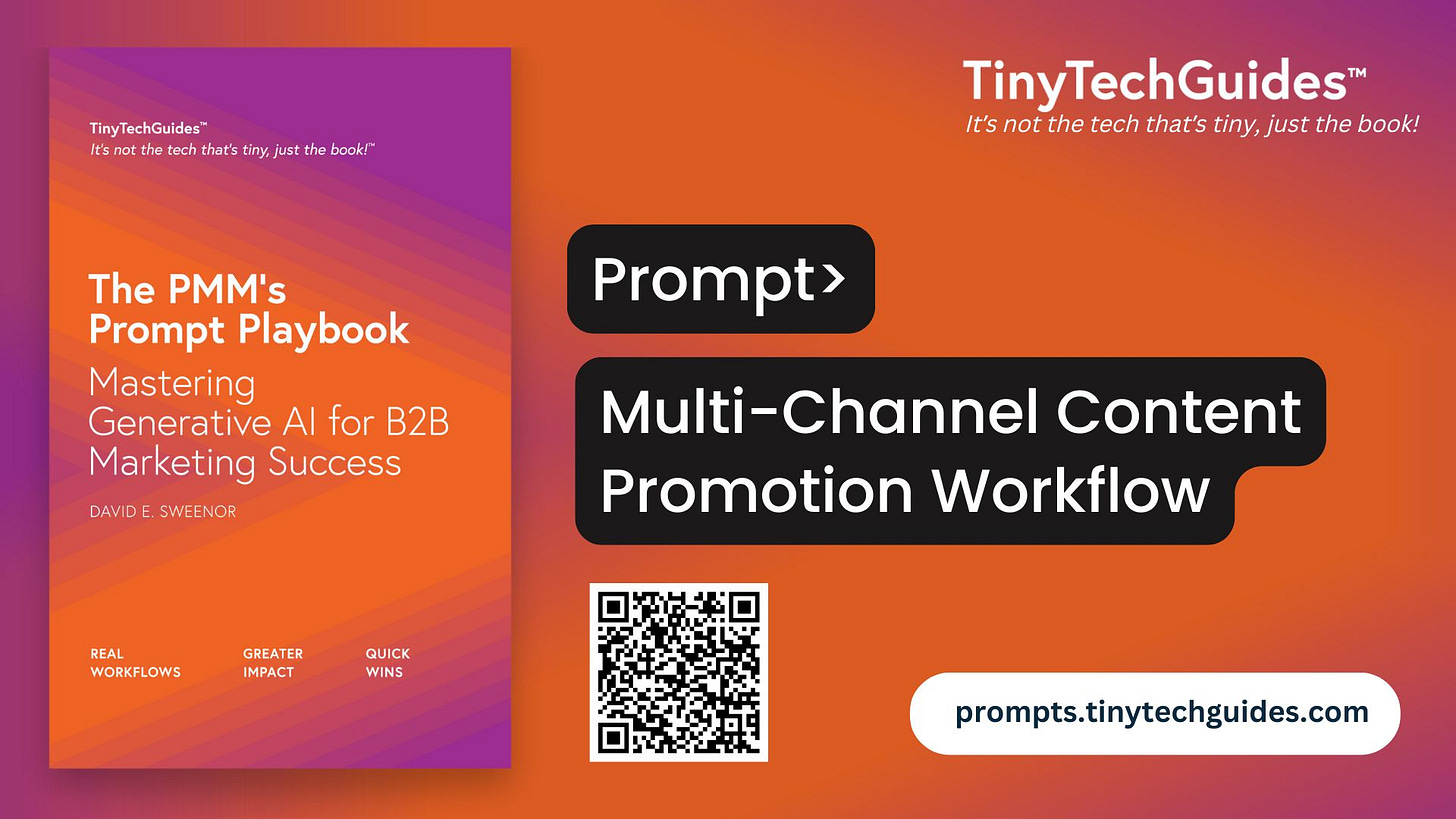Content Promotion Made Simple: Multi-Channel Campaign Builder
Plan, create, and launch a consistent, conversion-focused campaign for any asset—optimized for SEO, ads, and social media.
Multi-Channel Content Promotion Workflow
Created by prompts.tinytechguides.com
This prompt is not part of The PMM’s Prompt Playbook which has 30 ready-to-use prompts. If you're looking for more cut-and-paste prompts, join the Substack! Paid subscribers receive new cut-and-paste prompts every week.
Get the PMM’s Prompt Playbook and Modern B2B Marketing today!
Need help with product marketing or prompts? Let me know.
What does this do?
This workflow creates a high-performing multi-channel campaign to promote any content asset (e.g., whitepaper, ebook, case study, research report, checklist, webinar replay).
It includes:
Landing page copy optimized for SEO and mobile
Multi-email nurture sequence (awareness, value, urgency, optional post-download/demo transition)
Social media promotions (LinkedIn, Twitter/X, Facebook)
Digital ad copy (Google Ads, LinkedIn Ads, Facebook Ads, retargeting ads)
Tone and consistency refinement
KPI and tracking setup
Important: If you provide the content asset copy (or summary), the workflow will infer key benefits, themes, and positioning from it.
Goal: Maximize downloads, engagement, and conversions across channels while keeping messaging consistent and compelling.
Workflow Steps Summary
Step 0: Define Inputs
Step 1: Create Landing Page Copy
Step 2: Write Email Nurture Sequence
Step 3: Generate Social Media Promotions
Step 4: Write Digital Ad Copy (Including Retargeting Ads)
Step 5: Refine Tone and Messaging Consistency
Step 6: Define KPIs and Tracking Setup
Step 0: Define Inputs
{industry} = Target industry (e.g., enterprise cloud security)
{solution} = Product/solution name (e.g., AI-driven threat detection platform)
{content asset title} = Title of the asset (e.g., “The Future of Threat Detection”)
{content type} = Asset format (e.g., ebook, guide, case study, webinar)
{audience} = Target personas (e.g., CISOs, IT security managers, DevOps teams)
{pain points} = Key challenges (e.g., manual monitoring, compliance stress)
{value proposition} = Core value promise (e.g., “Automates anomaly detection to reduce downtime and minimize risk”)
{benefits} = Tangible outcomes (e.g., 50% faster response time, improved visibility, cost savings)
{CTA} = Call-to-action (e.g., “Download now,” “Watch the webinar”)
{brand tone} = Tone/voice guidelines (e.g., authoritative, approachable, innovative)
{visual guidelines} = Image/video or design notes (e.g., brand colors, modern tech imagery)
{hashtags} = Relevant hashtags for LinkedIn/Twitter (e.g., #CyberSecurity #AIInnovation)
{KPIs} = Success metrics (e.g., CTR > 3%, 100 downloads in first month)
If the user provides the asset copy or summary:
Infer {pain points}, {value proposition}, {benefits}, and tone cues from it.
Highlight unique insights or data in the content.
Step 1: Create Landing Page Copy
#Role
You are a digital copywriter creating a high-converting landing page for {content asset title}.
#Context
The page targets {audience} with challenges like {pain points}. The goal is to drive conversions by presenting the asset’s value and linking it to {solution} as a thought leader. If attached content exists, infer key benefits and insights. Include SEO meta description and make it mobile-optimized.
#Task
Write landing page copy with:
- Headline: Problem or benefit-driven
- Sub-headline: Explain the relevance of {content type}
- Value bullets: 3–4 takeaways
- CTA: Clear and action-focused
- Meta description: 150–160 characters for SEO
- Design note: Ensure readability and strong visual hierarchy for mobile
#Format
Headline: [short, bold benefit statement]
Sub-headline: [supporting text]
Value bullets:
- [benefit 1]
- [benefit 2]
- [benefit 3]
CTA: [e.g., “Download the Guide” or “Watch Now”]
Meta: [SEO meta description]
#Tone
{brand tone}, clear, benefit-driven, action-oriented
Step 2: Write Email Nurture Sequence
#Role
You are an email strategist creating a 3-email nurture flow plus an optional post-download email for {solution} in {industry}.
#Context
The {content type}, titled {content asset title}, addresses {pain points} and demonstrates benefits of {solution}. Audience: {audience}. If attached content exists, infer hooks, insights, and unique data.
#Task
Write:
- Email 1 (Awareness): Introduce the pain point + asset
- Email 2 (Value): Highlight insights, data points, benefits
- Email 3 (Urgency): Create time-sensitive reason to engage
- Email 4 (Optional): Post-download follow-up to lead toward demo/trial
Each email:
- Subject line + 1–2 variants
- Body (short, benefit-driven, include CTA)
- Personalization tokens where relevant
#Format
Email 1
Subject: [main] | [variant]
Body:
[hook sentence about pain point]
[introduce {content type}]
CTA: [link]
Email 2 … (same structure)
#Tone
Conversational, persuasive, action-driven, {brand tone}
Step 3: Generate Social Media Promotions
#Role
You are a social media strategist promoting {content asset title}.
#Context
Channels: LinkedIn, Twitter (X), Facebook. Goal: maximize engagement and clicks. Use {hashtags}. Suggest visuals from {visual guidelines}. If content is attached, pull out interesting stats or quotes.
#Task
Write:
- LinkedIn post (professional, 2–3 sentences, value-driven)
- Twitter posts (2 variants, 280 chars max)
- Facebook post (friendly, conversational)
Include hashtags and CTA link.
#Format
LinkedIn: “...”
Twitter 1: “...”
Twitter 2: “...”
Facebook: “...”
Visual suggestion: [based on {visual guidelines}]
#Tone
Platform-specific, engaging, {brand tone}



